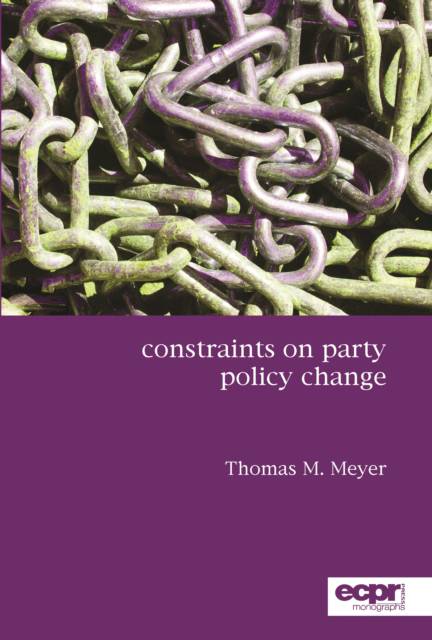
Door een staking bij bpost kan je online bestelling op dit moment iets langer onderweg zijn dan voorzien. Dringend iets nodig? Onze winkels ontvangen jou met open armen!
- Afhalen na 1 uur in een winkel met voorraad
- Gratis thuislevering in België vanaf € 30
- Ruim aanbod met 7 miljoen producten
Door een staking bij bpost kan je online bestelling op dit moment iets langer onderweg zijn dan voorzien. Dringend iets nodig? Onze winkels ontvangen jou met open armen!
- Afhalen na 1 uur in een winkel met voorraad
- Gratis thuislevering in België vanaf € 30
- Ruim aanbod met 7 miljoen producten
Zoeken
€ 73,45
+ 146 punten
Omschrijving
Political scientists are quite good at predicting 'optimal' policy positions that - under the given circumstances - allow parties to get maximal payoffs in terms of policy, office or votes. What we do not know is whether parties are actually able to take these positions or whether they are constrained to do so. This book attempts to narrow this gap. The major argument is that parties do not choose policy positions from scratch and that they cannot freely change their policy platforms. Rather, voters' lacking perception of changing party platforms and intra-party factors constrain parties when shifting their policy positions. An empirical analysis of party policy shifts in ten Western European democracies shows that these constraints differ across parties and thus affect the parties' position-taking differently. Considering this variation is important to derive more precise predictions for parties' policy platforms and for our understanding of party behaviour in general.
Specificaties
Betrokkenen
- Auteur(s):
- Uitgeverij:
Inhoud
- Aantal bladzijden:
- 285
- Taal:
- Engels
- Reeks:
Eigenschappen
- Productcode (EAN):
- 9781907301490
- Verschijningsdatum:
- 1/05/2013
- Uitvoering:
- Paperback
- Formaat:
- Trade paperback (VS)
- Afmetingen:
- 156 mm x 234 mm
- Gewicht:
- 403 g

Alleen bij Standaard Boekhandel
+ 146 punten op je klantenkaart van Standaard Boekhandel
Beoordelingen
We publiceren alleen reviews die voldoen aan de voorwaarden voor reviews. Bekijk onze voorwaarden voor reviews.











